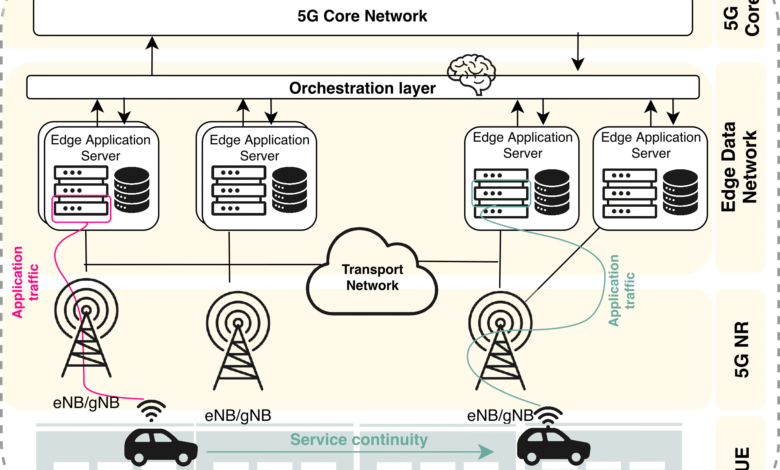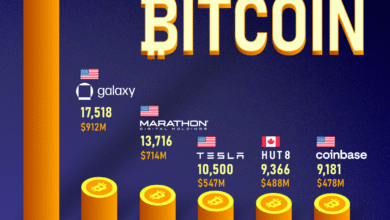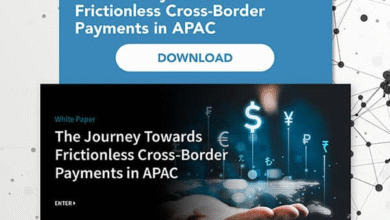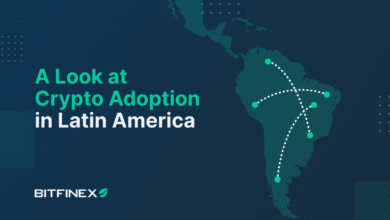Mobility Orchestration Network Enhances Cross-Border Mobility

The Mobility Orchestration Network (MON) is set to revolutionize global transit solutions by integrating blockchain technology into mobility systems. Developed through a collaboration between Toyota Blockchain Lab and Ava Labs, this innovative framework paves the way for unprecedented trust and transparency in cross-border mobility transactions. By addressing the financial barriers obstructing capital for electric vehicles (EVs) and autonomous fleets, MON aims to create a robust ecosystem that benefits all stakeholders. This strategic initiative not only enhances the fluidity of vehicle ownership as a financial instrument but also unlocks vital resources for sustainable transportation solutions. As the future of mobility evolves, the deployment of MON positions itself at the forefront of industry innovation and efficiency.
In an era where smart transportation systems are gaining momentum, the concept of Mobility Orchestration Network (MON) emerges as a fundamental building block for seamless vehicular coordination. This strategic initiative, which interlinks various modes of transport and financial instruments, reflects a shift towards more integrated and adaptive mobility frameworks. With growing attention to capital allocation for electric vehicles (EVs) and autonomous driving technologies, MON seeks to streamline cross-border mobility while fostering trust among different sectors. By establishing a transparent digital infrastructure, it holds the potential to transform not just vehicle financing but the entire landscape of how we perceive transportation assets. As industries pivot towards sustainable solutions, the efforts encapsulated in MON could prove pivotal in shaping the future of urban mobility.
Understanding the Mobility Orchestration Network
The Mobility Orchestration Network (MON) represents a groundbreaking approach to cross-border mobility through the application of blockchain technology. Announced by the Toyota Blockchain Lab in partnership with Ava Labs, MON seeks to address significant barriers within the mobility sector by fostering a collaborative digital ecosystem. The white paper lays out a vision where trust is seamlessly integrated into mobility frameworks, which in turn promotes the flow of capital essential for electric vehicles (EVs) and autonomous fleets. This innovative model allows participants to leverage verified data, thus paving the way for greater investment opportunities and enhancing the overall efficiency of mobility transactions.
At the core of the Mobility Orchestration Network is the concept of trust—a crucial element often missing in current mobility systems. By employing blockchain technology, MON enables stakeholders to create a shared ledger where vehicle ownership and operational histories are accurately recorded and maintained. This digital system addresses common issues such as fragmented organizations and mismatched regulations that exist across various countries, allowing mobility services to operate more fluidly across borders. As a result, the MON framework aims to streamline processes, reduce overhead costs, and foster an environment ripe for innovation.
Unlocking Capital for Electric Vehicles (EVs)
The collaboration between Toyota Blockchain Lab and Ava Labs brings new opportunities for financing electric vehicle (EV) ventures, a critical step in the transition towards greener mobility solutions. MON’s innovative protocols allow for the tokenization of vehicle ownership rights, facilitating easier access to capital markets. By breaking down financial barriers, MON can help attract substantial investment into the EV sector, thereby accelerating the deployment of sustainable transportation solutions. The potential to finance EV initiatives in developing economies can significantly impact their mobility infrastructure while aligning with global environmental sustainability goals.
In today’s fast-paced mobility environment, traditional funding methods often fall short, particularly when it comes to supporting innovative technologies like EVs. The Mobility Orchestration Network addresses this issue by offering a modular framework that empowers stakeholders to tap into new funding sources. As the demand for electric and autonomous vehicles surges, the ability to provide real-time, verifiable data about vehicle operations and ownership can enhance investor confidence. Consequently, MON not only meets the needs of modern mobility but also aligns with the growing expectations for transparency and accountability in the automotive sector.
Innovations in Autonomous Fleets and Cross-Border Mobility
Autonomous fleets represent a future where mobility solutions are not only efficient but also environmentally friendly. The Mobility Orchestration Network provides a robust platform for enabling the successful implementation of self-driving vehicles. By fostering a comprehensive database that records vehicle identities and operational timelines, MON ensures that autonomous fleets can operate reliably across different jurisdictions. This comprehensive tracking and verification underpin robust safety protocols, essential for gaining public trust and regulatory approval.
Moreover, the implications for cross-border mobility are profound. The use of Avalanche’s subnet technology facilitates communication between different regional mobility platforms without compromising existing financial systems. This seamless integration is vital for deploying autonomous fleets that can traverse borders effortlessly, meeting the demands of a globalized market. The ability to maintain operations across varied legal frameworks opens up diverse opportunities for mobility providers, creating a more interconnected world where autonomous transportation is accessible to all.
The Role of Blockchain in Mobility Solutions
Blockchain technology is transformative, and its role in mobility solutions cannot be overstated. With the introduction of the Mobility Orchestration Network, Toyota Blockchain Lab is harnessing the power of distributed ledger technology to enhance trust and transparency in mobility transactions. This innovative use of blockchain enables digital verification of vehicle identity and ownership, significantly reducing the risks associated with traditional asset transfer methods. As mobility services evolve, the proliferation of blockchain implementations is set to redefine how stakeholders interact within this space.
Furthermore, by employing blockchain, MON reduces the costs associated with mobility operations. Eliminating intermediaries and streamlining verification processes leads to lower transaction costs, making it easier for businesses to operate and grow. This is particularly beneficial for new entrants in the mobility sector, such as EV startups and autonomous vehicle operators, who often face significant financial hurdles. The ability of MON to act as a neutral layer of trust fosters an environment conducive to innovation and competition in an increasingly crowded market.
Future Implications for the Global Mobility Sector
The Mobility Orchestration Network is poised to reshape the global mobility sector by providing a framework that leverages blockchain technology to build trust and transparency among stakeholders. This approach has the potential to drive significant changes in how mobility services are structured, funded, and operated. As the landscape continues to evolve, the integration of advanced technologies such as blockchain, AI, and IoT will be essential in creating a holistic mobility ecosystem that meets the demands of modern consumers.
Moreover, as global cities strive for sustainability, initiatives like MON represent a crucial step towards achieving these goals. By enabling the efficient deployment of EVs, autonomous fleets, and other mobility services, MON not only addresses immediate regulatory and operational challenges but also positions itself as a leader in facilitating responsible mobility practices. The focus on cross-border applications can help ensure that emerging markets are not left behind in the green mobility revolution, underscoring the global importance of collaborative efforts in this space.
Challenges and Solutions in Mobility Ecosystems
As promising as the Mobility Orchestration Network may be, it faces inherent challenges within the complex mobility ecosystem. One significant hurdle involves ensuring compatibility between various regional regulations and technological infrastructures, which can vary widely. This variability poses risks of fragmentation, ultimately thwarting the efforts to foster a unified global mobility network. To address these challenges, MON emphasizes transparent collaboration with regulatory bodies and adherence to global standards, thereby driving towards a more interconnected platform.
Additionally, educating stakeholders about the potential benefits of adopting the Mobility Orchestration Network is essential for its success. Many organizations may still be hesitant to embrace such change due to concerns over security, complexity, or lack of understanding. Developing effective outreach programs and seminars will aid in raising awareness and demonstrating the value proposition of blockchain-powered mobility solutions. By creating a community that fosters knowledge sharing, MON can enhance stakeholder confidence and encourage widespread adoption of its systems.
Creative Financing Mechanisms for Mobility Startups
For mobility startups, securing capital can often be a daunting task, especially in an industry characterized by high costs and rapid technological advancements. The Mobility Orchestration Network provides innovative financing mechanisms that allow these startups to better utilize their assets. By leveraging the concept of tokenization of assets through NFTs, startups can engage potential investors much more easily, allowing their operations to scale efficiently. This modern approach not only democratizes access to funding but also enhances liquidity in the mobility space.
Furthermore, through MON, mobility startups can access a vast array of capital sources, ranging from venture capital to crowd-funding platforms facilitated by blockchain’s transparency and data verifiability. This paves the way for emerging players to align with traditional financial operators while promoting a more elastic financial ecosystem, where different types of investments can coexist and thrive. Such financial support ultimately enables mobility startups to drive innovation, develop cutting-edge technologies, and contribute to the broader objective of creating sustainable and efficient mobility solutions.
Collaboration Between Industry Leaders in Mobility
The success of the Mobility Orchestration Network greatly relies on collaboration between industry leaders, regulatory authorities, and technology providers. By forming strategic partnerships, key players in the mobility sector can work together to overcome the barriers that currently impede progress. This collaboration is essential in fostering an environment where innovative ideas can flourish, particularly for initiatives focused on sustainable mobility and enhanced transport efficiency.
Through fostering collaboration, MON not only aims to integrate advancements in technology but also enhances consistency in regulation and standards across regions. This will encourage all players in the mobility ecosystem—from established automotive giants to innovative startups—to work in harmony in addressing common challenges. Establishing such collaborative norms may ultimately lead to enhanced trust, clearer pathways for integration, and innovative solutions that can be adopted on a global scale.
The Future of Mobility with Industry Standards
The establishment of industry standards has never been more critical in the mobility sector as we progress into an era characterized by rapid technological evolution. The Mobility Orchestration Network strives to set benchmarks that govern operations across various mobility platforms, ensuring that they are compliant with ethical, financial, and operational guidelines. By adhering to these standards, MON enhances consumer confidence while promoting best practices within the industry.
Furthermore, the ability for MON to adapt with changing regulations globally indicates its potential to function as a role model in the mobility landscape. By prioritizing compliance in its framework, MON aims to facilitate smoother operations for companies looking to navigate different markets without falling afoul of local laws. As more stakeholders recognize the advantages of standardized operations, we can anticipate a future where mobility solutions are not only innovative but also universally accepted and trusted.
Frequently Asked Questions
What is the Mobility Orchestration Network (MON) proposed by Toyota Blockchain Lab?
The Mobility Orchestration Network (MON) is a blockchain-based framework developed by Toyota Blockchain Lab in collaboration with Ava Labs. It aims to enhance global mobility systems by improving trust and freeing up capital for electric vehicles (EVs) and autonomous fleets.
How does the Mobility Orchestration Network facilitate cross-border mobility?
The Mobility Orchestration Network utilizes Avalanche’s subnet technology to enable cross-chain messaging, allowing regional mobility platforms to connect seamlessly. This promotes smooth transactions and funding opportunities for cross-border mobility solutions without disrupting existing legal and financial systems.
What role does the Mobility Orchestration Network play in unlocking capital for EVs?
MON unlocks capital for EVs by addressing barriers that limit vehicles from being treated as fluid financial instruments. Through digital ‘Bridges’ and the Mobility Oriented Account (MOA), it enhances asset verification, leading to new funding avenues for electric vehicle deployments.
What innovations does the Mobility Orchestration Network introduce for autonomous fleets?
The Mobility Orchestration Network introduces innovations such as tokenizing ownership rights into non-fungible tokens (NFTs), which can be bundled into portfolios. This mechanism allows for better financing options and investment strategies for autonomous fleets.
How does the Mobility Orchestration Network integrate verified data to enhance trust in mobility?
MON employs a dual-account system known as Mobility Oriented Account (MOA) to capture a vehicle’s identity and operational history. This verified data builds a trust layer that supports due diligence and decreases risks for investors and stakeholders in the mobility sector.
Is the Mobility Orchestration Network developed as a closed system?
No, the Mobility Orchestration Network is designed as an open protocol, allowing for collaboration with standards organizations and technology partners to ensure broad applicability and integration into existing systems.
What are the potential applications of the Mobility Orchestration Network in developing economies?
In developing economies, the Mobility Orchestration Network can facilitate financing for electric vehicle deployments, establish self-driving taxi networks, and support vehicle-to-grid systems, leading to more sustainable and efficient mobility solutions.
How does the Mobility Orchestration Network reduce capital costs in the mobility sector?
By creating a more trusted and transparent framework and facilitating due diligence processes, the Mobility Orchestration Network aims to minimize risk exposure and capital costs associated with financing mobility assets.
| Key Point | Description |
|---|---|
| Introduction of MON | The Mobility Orchestration Network (MON) is a blockchain framework launched by Toyota Blockchain Lab and Ava Labs to enhance trust in global mobility systems. |
| Goals of MON | To unlock capital for Electric Vehicles (EVs) and autonomous fleets by addressing barriers in the mobility sector. |
| Identified Obstacles | Three main challenges: fragmented organizations, disconnected industries, and mismatched regulations across countries. |
| Proposed Solutions | Three digital Bridges that provide verification of trust through technical, institutional, and financial means. |
| Mobility Oriented Account (MOA) | A key component of MON that allows vehicles’ identities and histories to be recorded and tokenized. |
| Fungibility Ladder | Enables the transformation of ownership rights into NFTs that can be traded in global markets. |
| Leverage of Avalanche Technology | Utilizes Avalanche’s subnet technology to ensure regional mobility platforms can communicate effectively. |
| Application Areas | Includes financing EVs in developing economies and creating self-driving taxi networks. |
| Open Protocol Development | Toyota Blockchain Lab stresses that MON will remain an open system, collaborating with other organizations for implementation. |
Summary
The Mobility Orchestration Network (MON) introduces a transformative blockchain-based framework aimed at revolutionizing the mobility sector. By eliminating financial barriers and fostering trust between various entities in the industry, MON prioritizes the advancement of electric vehicles and autonomous fleets. Its innovative approach, including the use of digital proofs and tokenization methods, positions it as a critical player in addressing the financial complexity associated with mobility assets. As MON continues to develop as an open protocol, its collaborative approach with technology partners and standards organizations will facilitate a new era of global mobility, ultimately unlocking unprecedented access to capital and seamless operational integration across diverse markets.




